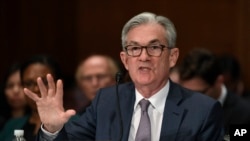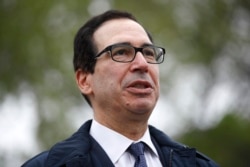U.S. Federal Reserve Chair Jerome Powell and Treasury Secretary Steven Mnuchin painted a bleak picture Tuesday of the economic devastation the coronavirus pandemic has wrought on the country, but they held out hope that a raft of loans and assistance to families and businesses would provide relief in the coming months.
“The job numbers will get worse before they get better,” Mnuchin told the Senate Banking Committee in remote testimony from the Treasury Department. Already, 36.5 million laid-off workers have filed for unemployment compensation, numbers not seen since the Great Depression in the 1930s.
Lawmakers pressed the two key economic officials about the pace of government relief and whether the hundreds of billions of dollars already approved by Congress have been dispersed to businesses in dire need of funding as they face imminent collapse.
“I would expect all the capital to be allocated,” Mnuchin said. But he declined to assure one Democratic critic of the Trump administration, Sen. Elizabeth Warren of Massachusetts, that companies would be required to give all laid-off workers their jobs back as the economy slowly recovers.
Congress is in a contentious debate over whether more recovery spending needs to be approved, with the Democratic-controlled House of Representatives approving another $3 trillion last week. President Donald Trump has said the measure would be “dead on arrival” at the White House, with Senate Republicans also balking until the effect of already-approved funding is assessed in the coming weeks.
Even so, the Fed’s Powell told the lawmakers, “We need to be prepared to act further, and we are if the need is there.”
Much of the United States is gradually reopening for commerce, but Sen. Sherrod Brown, an Ohio Democrat and Trump administration critic, asked Mnuchin whether it was too soon.
“How many workers should give their lives to increase our [gross domestic product] by half a percent?” Brown asked.
“No workers should give their lives to do that, Mr. Senator, and I think your characterization is unfair,” Mnuchin responded.
“All of us are affected, but the burdens are falling most heavily on those least able to carry them,” Powell said. “It is worth remembering that the measures taken to contain the virus represent an investment in our individual and collective health. As a society, we should do everything we can to provide relief to those who are suffering for the public good.”
The central bank chief said, “The scope and speed of this downturn are without modern precedent and are significantly worse than any recession since World War II.
“This precipitous drop in economic activity has caused a level of pain that is hard to capture in words,” Powell said, “as lives are upended amid great uncertainty about the future.”
The Fed lowered its benchmark interest rate to near zero in March. Powell promised that the Fed expects “to maintain interest rates at this level until we are confident that the economy has weathered recent events and is on track to achieve our maximum-employment and price-stability goals.”
Mnuchin echoed Powell’s concerns about the U.S. economy in his opening remarks, saying, “This disease is impacting families and communities across the nation. Through no fault of their own, the American people are also enduring economic challenges.”
But he said that due to efforts of medical professionals throughout the U.S., “I am confident that our nation will emerge from the pandemic stronger than ever before.”
He said that hundreds of billions of dollars in grants and loans to families and businesses have been doled out already to ease the country’s economic burden from the pandemic.
“We are sympathetic to hardworking Americans and businesses enduring tremendous challenges due to the COVID-19 pandemic,” Mnuchin said. “We have had to take unprecedented steps to shut down significant parts of the economy in the interest of public health.”
He said that as a result, “We are continuing to see large unemployment and other negative indicators. It is important to realize that the large numbers represent real people.”
But he said, “As we listen to medical experts, we are optimistic about the progress being made on vaccines, antiviral therapies, and testing. Working closely with governors, we are beginning to open the economy in a way that minimizes risks to workers and customers. We expect economic conditions to improve in the third and fourth quarters.”
The U.S. coronavirus death toll now tops 90,000, by far the biggest national total across the globe, with 143,000 expected to die by early August.
But Mnuchin said, “Together we will destroy the COVID-19 virus and our country will emerge from the pandemic stronger than ever.”





